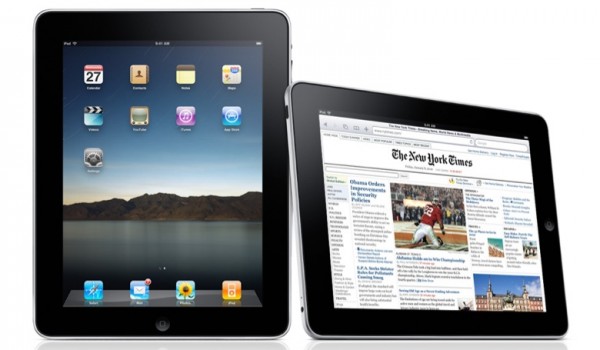 Disclaimer: I’m an Apple junkie. Have been since my first computer (a beloved Apple IIc in the early 80s); probably always will be. Which is why my heart’s torn this morning, between Uncle Steve’s latest invention and booksellers everywhere. The slammin’ new iPad is going to be an issue to contend with, even more than Kindle was, for retailers specializing in the written word.
Disclaimer: I’m an Apple junkie. Have been since my first computer (a beloved Apple IIc in the early 80s); probably always will be. Which is why my heart’s torn this morning, between Uncle Steve’s latest invention and booksellers everywhere. The slammin’ new iPad is going to be an issue to contend with, even more than Kindle was, for retailers specializing in the written word.
Why more than Kindle? Color. Apps. Screen size. Expandability. Cool factor. Let’s face it-—this “iPod on steroids” packs a wallop that even Amazon isn’t prepared to face.
The strongest selling point, however, comes from a brilliant decision on Apple’s part-—to partner with McGraw-Hill, the nation’s largest publisher of educational text books. College campuses are hotbeds for Apple product purchases, after all. Tying a tech-friendly audience, the iPad, and required reading together with one big bow not only corners an untapped market, but trains future reading adults to default to e-books, as opposed to paper and ink.
Which doesn’t bode well for bookstores ten years from now.
Yes, it’s pricey up front, but the expected lower cost of e-texts, combined with the significantly lighter load in one’s backpack and the crazy-wild expandability of the unit, will make this a simple decision for lots of students.
My hope is that there’s an open door for independent book sellers to jump into the technology game, and fast. Whether it’s selling e-books or the readers themselves, I have a feeling we’re watching the opening scenes of “You’ve Got Mail-—Virtual Version.”


Click here to tell me what you think....
We have been watching this transition play out for several years, now. What is starting to change, slowly, is the technology that would provide an alternative to a physical book. It will continue to get better and, eventually, will offer a rich and rewarding reading (and watching) experience and will likely be interactive. College stores have had a lot of time to plan for this and our associations have worked non-stop to explore ways to keep stores viable well into the future. It seems unlikely that students will wait in lines to interact with owners of digital products. Such products will likely be sold over the internet by the originator (author or some aggregator) to students where they (and their electronic devices) are.
Of course, it will be a few years before textbooks are relegated to “niche” status. But before long, they will be viewed as “low-tech” by increasingly tech-savvy students. At the same time, universities will be pushing for the type of course materials that are in demand by their students (their customer).
It is time to embrace a bigger vision of the college store….one that does not rely on selling mostly textbooks. There is a growing demand for technology and convenience items that students will need in the future. Schools will likely continue to want a retail presence that reflects their lifestyle and image (including support for sports teams) and one that responds to the needs of their students. There is a great opportunity for college stores willing to change.
Editor’s note: I do not know what associations are being referred to in the first paragraph, but welcome the author to please let us know…just makes it easier to understand the entire post in context.
As both the wife of a small business owner and a full-time college student at a state college I pose this question; since when is the college bookstore a small independent? The bookstores I have run into are run by either Follett or Barnes and Noble. They even discourage students from coming into the physical store and instead want you to order your books online to “save yourself the hassle of standing in line”. Maybe this is just with state schools, maybe private schools are different?
Editor’s note: There are quite a few locally owned, independent college bookstores—regardless of whether the neighboring campus is a state school or private institution. Quite often, they have a larger following that the school-sponsored stores nearby.
I have been a College Store Manager for 30+ years. The speed of the transition to e-books is definitely increasing, and the Ipad may accelerate it. However, the initial reaction by students to E-books has not been all that favorable. Another factor is that the senior faculty at many campuses are, just like many citizens of a more “mature” persuasion, still amazingly backward technologically., These tend to be the decision makers as to what course materials are to be used. It should be interesting as this constituency collides with the younger generation coming up who have been exposed to digital media since youth and expect to use it in their learning..